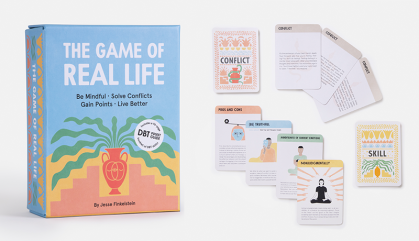Rutgers Psy.D. Student Creates Mindfulness Game for Anxiety, Burnout Prevention
The Game of Real Life "teaches people how to cope with life’s many challenges"

Zen Buddhists inspired it, Lady Gaga has touted it and now, thanks to the innovative work of a Rutgers doctoral student, a major publishing house thinks you should try it: Dialectical Behavior Therapy (DBT).
The Game of Real Life, a card game created by Rutgers Graduate School of Applied and Professional Psychology’s Jesse Finkelstein, draws on DBT, a psychotherapy that combines behavioral science with concepts like acceptance and mindfulness. The game is designed to teach skills for combating anxiety, promoting active listening and preventing burnout.
Players address “conflicts” – everything from grief to money management – using DBT “skills,” such as Loving Kindness and Paced Breathing. Players take turns explaining how the Skill Cards in their hand can address the Conflict Card flipped over at the start of each round. Players consult an accompanying booklet – essentially a pocket guide of the DBT handbook – that includes simple definitions of key DBT principles.
Finkelstein has used the game in his own clinical practice. During weekly skills group meetings in New Jersey, he teaches people how to be mindful in their daily lives through the application of DBT techniques, lessons he takes to heart. “There is not a moment that I am not thinking about how DBT can help me in my own life,” he says.
The game’s journey from idea to the neighborhood bookstore began on Kickstarter. Finkelstein, who was an illustrator before joining the Dialectical Behavior Therapy Clinic at Rutgers (DBT-RU), approached the crowdfunding site with the concept in 2019 after developing it with support and mentorship of GSAPP Professor Shireen Rizvi and DBT-RU colleagues.
Then came the COVID-19 pandemic and a surge in public interest in wellness techniques, DBT in particular. An original Kickstarter fundraising goal of $3,000 turned into a final tally of nearly $135,000. With this seed capital, Finkelstein, who did all the illustrations for the game, developed the idea further and landed an agent, who helped him pitch to Penguin Random House’s lifestyle group, Clarkson Potter. It went on sale this month.

The DBT concept was developed in the 1980s by Marsha M. Linehan, a professor of psychology at the University of Washington. Linehan, a trained Zen teacher, combined elements of Zen practice with psychology to create an innovative therapy that helps people navigate mental health issues. The technique has recently grown in popularity, and Lady Gaga has called it a “strong way of learning how to live” while “understanding your emotions.”
Since the game’s completion, Finkelstein and colleagues at DBT-RU have also created a series of videos teaching DBT techniques, which have become a resource for clinicians around the world.
“DBT teaches people how to cope with life’s many challenges,” he says. “These are life-living skills, and my goal is to get them in front of as many people in as many creative ways as possible.”
